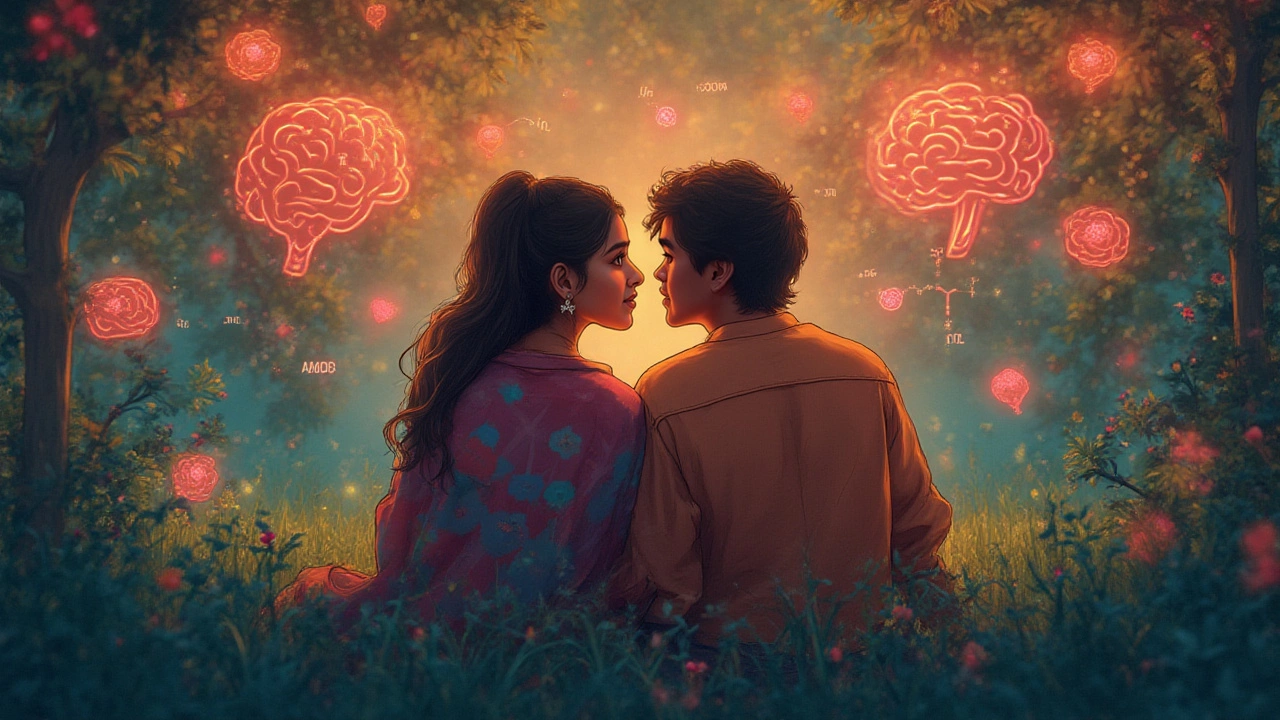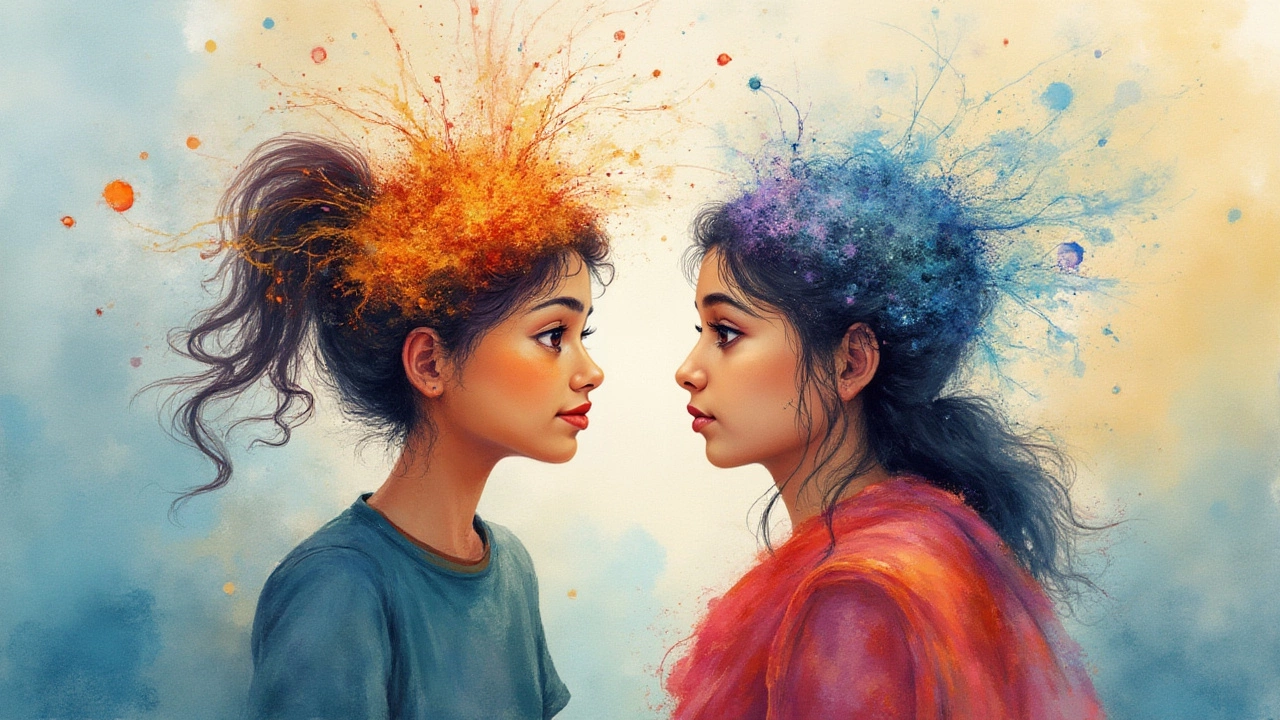What is Love? The Real Meaning, Science, and Everyday Truths Behind the Feeling
 Jul, 13 2025
Jul, 13 2025
Ever noticed how one word—love—can mean everything and nothing, all at once? It’s the word people carve into trees, tattoo on their skin, slip awkwardly into late-night texts, and whisper in hopes of being heard back. But for something so universal, people still freeze when you ask, "So, what is love?" Forget the slow-motion movie montages and Bollywood songs blasting out the answer. Love isn’t just about Bollywood rom-coms, roses, or candlelit dinners (though those are nice once in a while). It’s sticky, complicated, sometimes infuriating, but often the strongest force shaping our lives. Love’s the reason your dog bounds up the steps even after you step on his paw (Sorry, Bruno). It’s why parents stand in the blazing sun at a sports match and why a friend calls at 2 AM with nothing much to say, but just because. When you chase the answer to ‘what is love,’ you have to break past the cliches and get a bit honest, even messy. Let’s splatter some paint on the picture and see what it really looks like.
The Science of Love: What Really Happens In Your Brain?
Here’s a fact that might surprise you—love is as much chemistry as poetry. When people fall in love, the brain starts firing on all cylinders. Scientists have actually shoved couples into MRI machines (science is wild sometimes) and watched their brains light up in patterns, kinda like a Christmas tree. The main stars? Dopamine, oxytocin, serotonin, and a dash of adrenaline for good measure.
Dopamine is the ‘feel-good’ chemical. It's what gives you that rush—the excitement, the butterflies, the thrill when you see someone you like. Remember that crazy grin on your face in early days? That was dopamine steering the ship. Oxytocin—sometimes called the ‘cuddle hormone’—is what shows up when you hug, touch, or just feel safe with someone. It’s the hormone behind parents falling for their newborns too. When you and Bruno flop together on the floor, that’s oxytocin in action.
Adrenaline explains why your hands sweat, your heart races, and you stumble over your own words around a crush. Evolution kept this cocktail of feelings because, honestly, we needed humans to pair up and stay together long enough to raise kids. But here’s the wild twist: Studies in 2020 out of Stanford found that people in relationships actually start to sync their hormone patterns over time. It’s like two radio stations tuning to the same frequency.
But it’s not just about short-term sparks. Long-term love is when serotonin and a slow, steady wave of oxytocin help build something solid. Your brain actually calms down, which is why a deep, years-long relationship won't feel like the first date forever—and that’s a good thing. Anything that lasted at a fever pitch would fry your circuits. Crazy in love is fun, but calm, steady love is what helps people face the worst days and celebrate the best.
Here’s a quick peek at how your body reacts at different love stages:
| Stage | Key Hormone | What You Feel |
|---|---|---|
| Crush/Infatuation | Dopamine, Adrenaline | Excitement, anxiety, racing heart |
| Early Dating | Serotonin, Dopamine | Euphoria, obsession, energy |
| Attachment/Long-Term | Oxytocin, Vasopressin | Calm, security, emotional bonding |
So yeah, the next time you’re blushing for no reason or feeling weirdly peaceful around someone you care about, don’t blame the movies. That’s your brain at work.
More Than Romance: Kinds of Love We Forget To Talk About
First thing that pops into people's heads with ‘love’ is always romance—hearts, red roses, Instagram posts with #CoupleGoals. But that’s just one flavor in a whole giant buffet. Ancient Greeks even had different names for kinds of love—it’s that varied and complex! There’s eros (romantic), philia (friendship), storge (family), and agape (a sort of deep, unconditional care). Science backs this up: a UCLA study from 2021 suggests that platonic friendships give the same brain rewards as romantic partners, just in a different style.
Remember being a teenager, loyal to a group of friends like your life depended on it? That’s philia at its best. Ever found yourself worrying more about your sister’s broken heart than your own? Classic storge. And if you volunteer time, money, or effort with no hope of getting anything back—that’s agape.
Then you have love for pets—something easy to overlook. When Bruno (my dog, who currently snores louder than my old scooter) clings to me every morning, it’s not just about food. Studies show oxytocin rises not just in owners, but also in pets when they gaze into each other’s eyes. This explains why people mourn pets as truly as they do humans. Love doesn’t stop at species, which is probably the best evidence it’s a real, natural part of life.
Sometimes, the love you feel for a hobby counts too—ever seen someone talk about football, poetry, or music? Their whole face lights up. It might not make for a Valentine’s Day card, but it sure adds color to life.
- Romantic love motivates risky gestures, proposals, and declarations.
- Friendship love provides the backup when relationships crumble or jobs fall through.
- Family love hangs around quietly—it means packing a lunchbox or picking you up late at night.
- Self-love (the most underappreciated) keeps you afloat when the world feels heavy.
Try counting all the kinds of love surrounding you and you’ll find it’s a web, not a single thread. If you’d lost sight of that, maybe it’s time to see who else is in your circle besides ‘the one’.

How Love Changes Us: Tricky Truths and Real-Life Lessons
Ever found yourself acting out of character—maybe a little too goofy, or more generous than usual—just because someone made your heart race? Love isn’t just an emotion; it seeps into every part of your life. Psychologists at Harvard did a massive study in 2018 tracking more than 70,000 people, and the verdict was blunt: people in healthy relationships have lower stress, better health, and live longer. Even your immune system gets a boost.
But don’t believe that it’s all sunshine and heart emojis. Real love is downright inconvenient sometimes. It’ll have you apologizing when you’re absolutely sure you’re right, or doing embarrassing things like dancing badly at weddings. Being in love means learning to forgive, compromise, and (sometimes) even let go. Most surprising is how it can push you to become a bigger, messier, and kinder version of yourself.
This gets even deeper when things get tough. Anyone can say “I love you” on a great day. What about when someone loses their job, gets sick, or messes up badly? Couples who stay together through tough times usually have one thing in common: they choose commitment over instant pleasure. Surveys from the Pew Research Center show that 64% of long-term couples credit ‘teamwork in facing problems’ as the core reason they stick together—not chemistry, not sex, not shared hobbies.
Love can force you to see your own flaws too. If you’re the stubborn type, it teaches humility. If you’re anxious, it brings comfort. Done right, love grows you up like nothing else. Poet Rainer Maria Rilke once wrote, “For one human being to love another: that is perhaps the most difficult of all our tasks.” Turns out, he was onto something.
And for parents, love complicates even your biology—women’s hearts enlarge during pregnancy while fathers’ brains adapt to pick up babies’ cries. Moms, dads, kids, grandparents—this whole crazy system is wired to keep us together, even when we’re fighting over TV remotes or sharing the last samosa.
- If you find yourself caring deeply for someone, it’ll likely make you more empathetic in other areas of life.
- Love pushes boundaries – people have crossed oceans, fought wars, even invented countries, all in its name.
- Love endures change—both the wild and the slow-burning kind.
- Keeps us accountable and hopeful during dark times.
Makes you see, love isn’t about avoiding the hard stuff, but having someone or something worth facing it with. And that, oddly enough, is the ultimate adventure.
Practical Tips to Recognize and Keep Real Love
Everyone wants to fall in love, but figuring out whether what you feel is real or something else—well, that’s a different story. Here are some no-BS signs you’re in the real deal, or at least on your way:
- You feel safe being your weird, embarrassing self. Real love starts with acceptance, not just butterflies.
- It’s oddly easy to forgive small screw-ups. A fight isn’t the end—sometimes it’s just a sign you both care.
- You make sacrifices (and feel good about it). Something as simple as picking up your partner’s favorite chips or letting your best friend rant about work shows a real give-and-take.
- Jealousy feels less important. You trust more, worry less about competition.
- You have more patience. Even when that person puts socks everywhere except the laundry basket.
If you want love to last, psychologist John Gottman has tracked thousands of real couples for forty years and says it boils down to a few habits:
- Listen, really listen—phones down, eyes up.
- Say thanks, even for boring things.
- Keep up the small gestures; they matter way more than grand declarations.
- Fight fair. Name-calling and silent treatment kill intimacy.
- Don’t avoid the mess; talk about fears, dreams, and even awkward topics like money or doubts.
- Keep growing. Nobody is perfect—both of you will change, so stay open to learning new ways to love.
Remember—love isn’t loyalty to a single person only. Family, friends, pets, yourself: these circles intersect. If you’re struggling after heartbreak, don’t wall yourself in. Trained therapists, support groups, even spending time with animals (science proved it: hugging your dog actually lowers stress hormones) can help you heal faster than just toughing it out solo.
And here’s your cheat code to the best relationships: what is love isn’t just about falling head over heels, but learning to stand, wobble, fall, and get up next to someone—or some dog—who makes the chaos feel worth it. If you get that, you’re already closer than most.